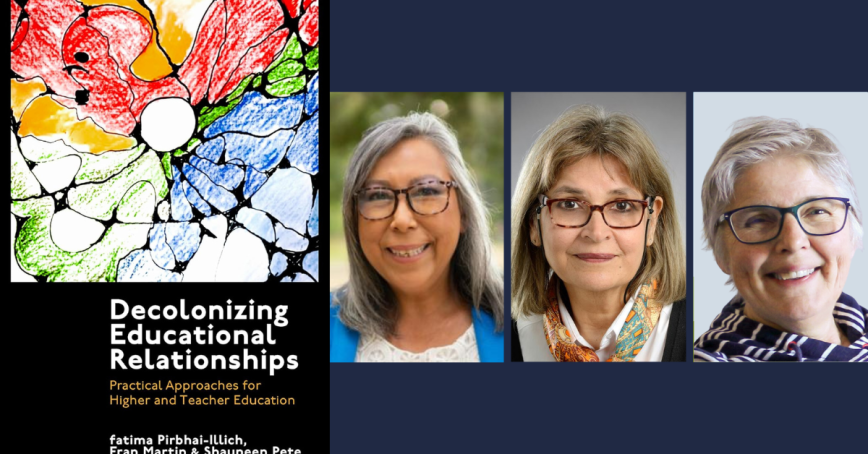De/colonizing educational relationships

Researchers and teacher educators Shauneen Pete, Chair of Emerging Indigenous Scholars Circle, at Royal Roads University, Fatmakhanu (fatima) Pirbhai-Illich, Professor of Language and Literacy Education at the University of Regina in the Teacher Education Program, and Fran Martin, Honorary Research Fellow in the School of Education at University of Exeter have been working together over several years to de/colonize educational relationships in higher and teacher education.
The term decolonize has been used in many institutions of higher education in various ways however, “our way of thinking about this is that there is no utopian decolonized space,” fatima explains.
“In some way or other, we have all been colonized and thus we already ‘view and do’ in the world with a colonized lens and thus cannot decolonize completely. Thus, following Bhattacharya (2018), we use the term de/colonize to indicate that there is no pure decolonial space and that we are always in conversation with the coloniality of our times and the de/colonial spaces that we’re trying to bring together – a sort of symbiotic relationship.“
The trio focus on relationality and bringing their three different lenses together – Shauneen, who is Indigenous, fatima, who is a settler, and Fran, who is from the seat of colonialism, – resulting in a unique approach to de/colonization that they’ve shared with fellow educators.
While their partnership has seen several significant milestones – including a virtual seminar series on de/colonizing educational relationships at the University of Regina this spring – their upcoming book collaboration slated for release in December brings together over a decade’s worth of research, study, and exploration.
The way the trio approach de/colonization starts with de/colonizing their own thinking in relation with one another. The process asks much of them: courage, trust, truth, humility, vulnerability, listening, openness, and a commitment to learning.
fatima sums up their approach by sharing the foundation of the working relationship, established at the outset of their discussions, “When Fran and I started working together I said to her, there has to be truth telling, and not just the telling of truth but we also we have to be truthful about ourselves and with each other, because otherwise it’s not going to work.”
Shauneen agrees, “It requires vulnerability and an active commitment to remain true to this relationship with one another, to show up, to be ready, to be conscious of the discomforting places or edges where we find ourselves, and to trust that when we pose questions to each other that it’s to expand the relationship.
“Through the course of our collaboration we’ve gained a deep appreciation for one another. These two women are brilliant writers and theorists and it’s my honor to work alongside them.”
Fran echoes Shauneen, “I feel like I’ve learned a new language working with Shauneen and I’m still learning, Amongst the many wonderful things I’ve learned from Shauneen is a different way of using words and expressing ideas.”
In one of her explanations around how they work with each other, Shauneen states, that “we had discussions around the theme of hospitality where we recounted some of the events that we’ve experienced and then we explained our different orientations to these events. These discussions take you to those very edges where our world views have shaped our thinking about a place or an event differently and we get into that critical conversation of what does that mean for each of us?”
When asked what does de/colonizing higher and teacher education meant, fatima responded, “We have a different take on de/colonizing educational spaces than other conceptual, research, and pedagogical work that we see in academia and K-12 schools. Our intention is on de/colonizing relationships in education, with the focus firmly on relationships.
"We focus on this because over the years we have come to understand that critical relationality is key to educational success. We learn from each other, work with each other, and live with each other with all of our differences; always with an understanding that we have to engage in criticality for there is no neutral space, language, and ways of being and doing. Our work symbolizes what I hope for Canada to be like – a truly pluriversal society.”
Their book, Decolonizing Educational Relationships: Practical Approaches for Higher and Teacher Education, brings three different lenses to a very practical understanding of what de/colonization could be about. A doable project. You will note in their forthcoming book, that the format of the book also challenges what it means to be an academic writer in higher education. In addition to traditional chapter formats, it contains poetry, narratives and conversations, while introducing theory as a mechanism for deepening our relational practice.